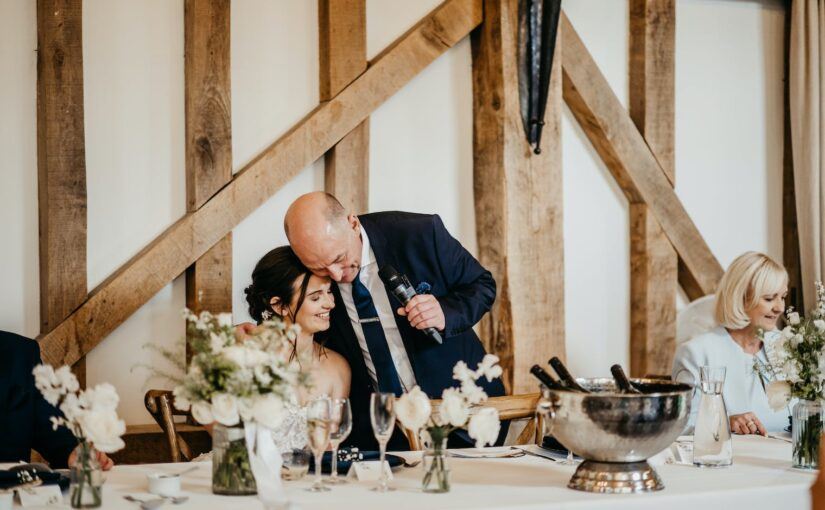Wedding speeches are a cherished tradition at weddings, and an essential part of the wedding reception. They’re a way for the bride and groom, as well as their loved ones, to express their love and appreciation for each other on their big day, and can set the tone for a fun, emotional, and memorable evening.
But with so many speeches to include, it can be difficult to know the order to give them in. In this post, we’ll provide a guide to the traditional order of wedding speeches as well as possible adaptations, to help make your wedding day as unique as possible.
The origins of the traditional wedding speech order
The traditional order of wedding speeches has evolved over time, reflecting changing societal norms and values. Historically, the speeches have centred around the groom and the bride’s father, with the best man offering a light-hearted conclusion. As gender roles and wedding customs have evolved, the traditional order has adapted to include more diverse perspectives, with maid of honour speeches now the norm, and sometimes also bride and mother of the bride speeches too. Understanding the roots of these customs can help you appreciate the significance of each speech and the order to give them in at your wedding.
Traditional wedding speech order: cheat sheet
Before we dive into the details, take a look at the cheat sheet below to see how the different speeches at a wedding all flow and fit together. First is the father of the bride’s speech, then the groom’s speech, then the best man and maid of honour, and finally, any other speakers from the wedding party.
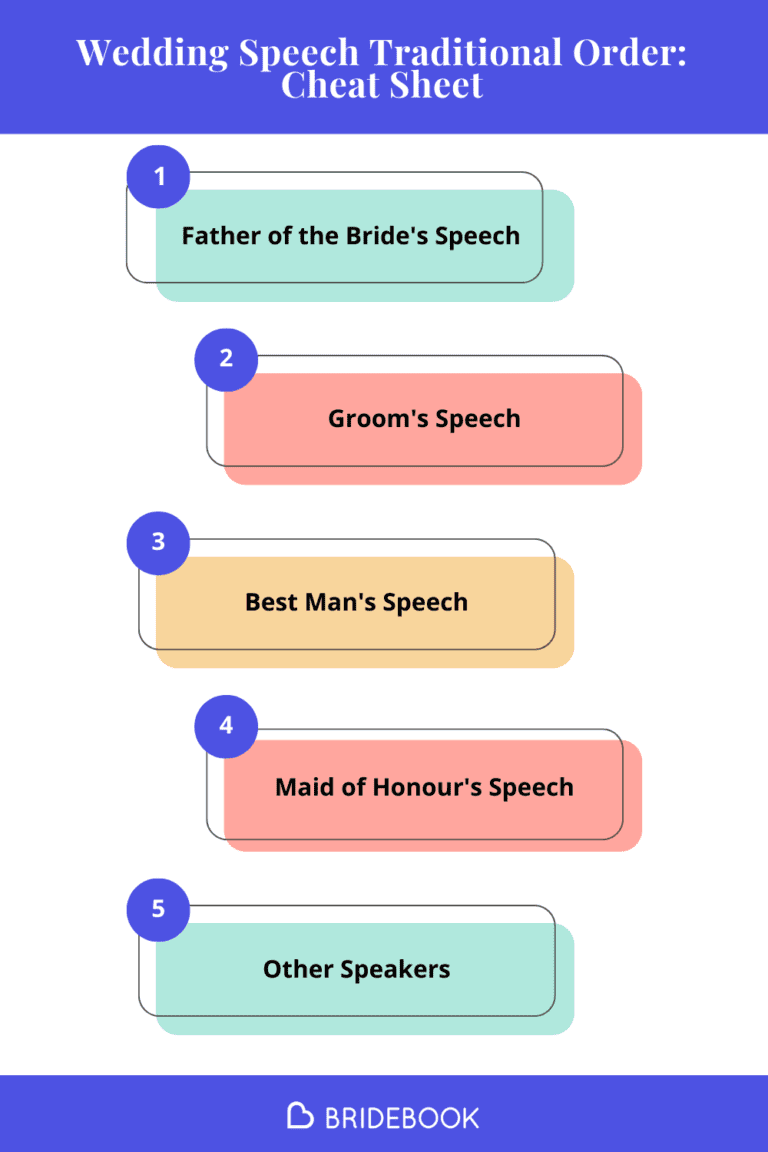
1. The father of the bride’s speech
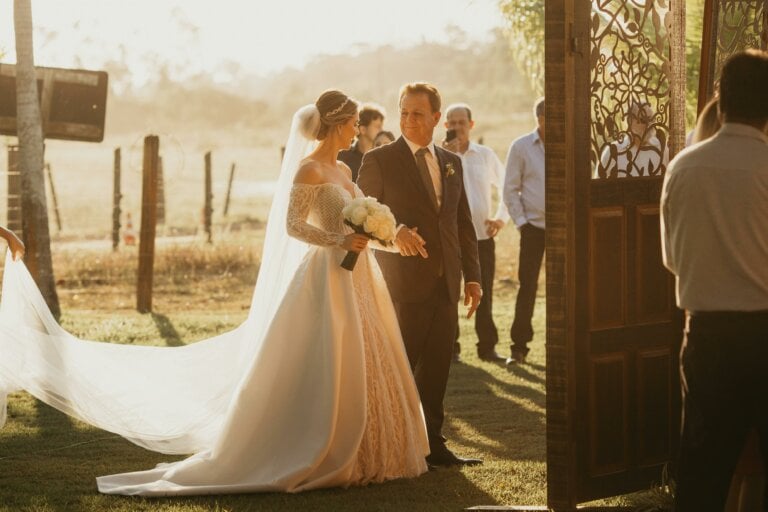
Traditionally, the father of the bride is the first to give a speech. The father of the bride’s speech is typically a touching and emotional tribute to the bride, expressing the father’s love and pride for her, and wishing her happiness in her marriage. The father of the bride will usually welcome the guests, thank the groom for loving and caring for his daughter, and make a toast to the happy couple.
Check out our top father of the bride speech examples for inspiration and a complete breakdown on how to structure your speech.
2. The groom’s speech
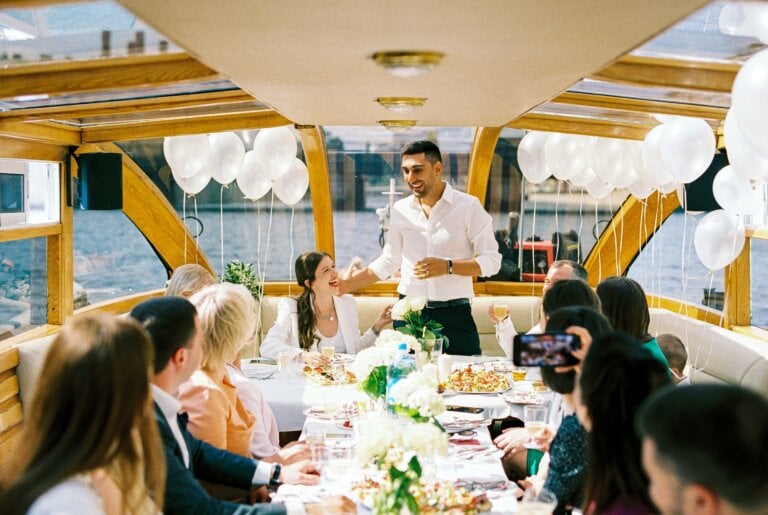
The groom’s speech is next in the order and is a time for him to express his love and gratitude to his bride, as well as to thank the wedding party, guests, and parents of the bride and groom. The groom may also take this opportunity to tell a few anecdotes or share memories of his relationship with his bride. This speech is usually light-hearted and humorous, but it should also be sincere and heartfelt.
3. The best man’s speech
The best man’s speech is one of the most anticipated speeches of the wedding reception. This is the best man’s chance to share some memories of the groom and offer some humorous anecdotes about him. The best man may also offer a toast to the happy couple and offer some words of advice for their future together. This speech should be light-hearted and entertaining, but it should also be respectful and appropriate.
Check out our top best man speech examples for inspiration and a complete breakdown on how to structure your speech.
4. The maid of honour’s speech (if applicable)
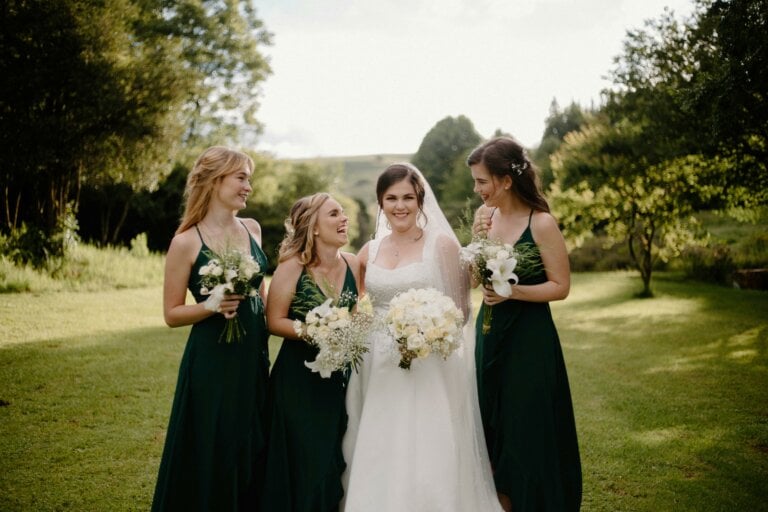
If the bride has chosen to have a maid of honour, she will typically give a speech next. The maid of honour’s speech is a time for her to express her love and appreciation for the bride, as well as to share some memories of their friendship. This speech should be heartfelt and emotional, and the maid of honour may also offer a toast to the happy couple.
5. Other speakers
If there are any other speakers at the wedding, they may give their speeches after the best man and maid of honour. This may include the mother of the groom, close friends, or other members of the wedding party. These speeches should also be heartfelt and sincere, and the speakers may offer a toast to the happy couple.
Check out our wedding speech examples for inspiration and ideas on the kind of speeches you can give, including a joint speech given by the couple.
How to write a successful wedding speech
Regardless of the order of speeches at a wedding, there are a few essential elements that can make a wedding speech memorable and engaging:
- Speak from the heart: Genuine emotions and heartfelt expressions resonate deeply with the audience. Be sincere in your words and share your true feelings.
- Keep it concise: Aim for a speech length of 5-7 minutes to maintain the audience’s attention and keep the reception on schedule.
- Balance humour and sentiment: A well-rounded speech strikes a balance between humour and heartfelt sentiment. While humour can keep the audience entertained, sharing genuine emotions and personal stories can make the speech more meaningful.
- Practice makes perfect: Rehearse your speech multiple times before the big day to ensure a smooth delivery and to calm any nerves.
Adapting the traditional order to a modern wedding

While the traditional order of wedding speeches provides a solid foundation, many couples choose to adapt the format to suit their preferences or to include additional speakers. Modern weddings may feature speeches from the bride, the mother of the bride or groom, the maid of honour, or even close friends and family members. The key is to find a balance between tradition and personalization, ensuring that the speeches reflect the unique character and dynamics of the couple and their loved ones.
If you’re looking for some non-traditional ideas, here are some examples of speech ideas other Bridebook couples have shared with us. Feel free to incorporate them into your own wedding speeches to make for a more unique and personalized speech structure.
- Joint couple speech (bride and groom)
- No speech from either the groom or the bride
- Gender-equal speeches (including bride and mother of the groom speeches)
- Mother and father of the groom speeches
- Sibling or children speeches (of both the bride and groom)
- Bridesmaid and groomsmen speeches
- A mob speech instead of the traditional father of the bride speech
- Opening up the floor to whoever wants to speak
- Alternative pre-recorded speech featuring multiple speakers
- No speeches or vows in the traditional sense (pub quiz style instead)
Top tips for customizing the traditional speech order
If you choose to modify the traditional order of wedding speeches, consider the following tips:
- Keep the flow: When rearranging the speech order, ensure there is a smooth flow between speakers, transitioning from more formal and sentimental speeches to lighter, more humorous ones.
- Communicate with your speakers: Inform your speakers of any changes to the traditional order and provide clear guidance on their roles and expectations.
- Consider the audience: When adding new speakers or rearranging the order, be mindful of your guests’ attention span and strive to maintain engagement throughout the speeches.
- Embrace diversity and variety: Incorporating a variety of perspectives can enrich the wedding speeches, providing a more comprehensive reflection of the couple’s journey and relationships.
Start planning your wedding on Bridebook
For more wedding tips and tricks, sign up to Bridebook today. We’ve got a host of fantastic articles to help you with your wedding planning and celebrations.
